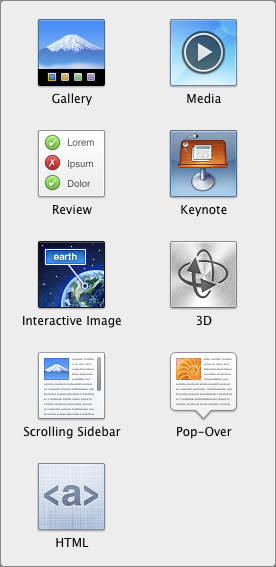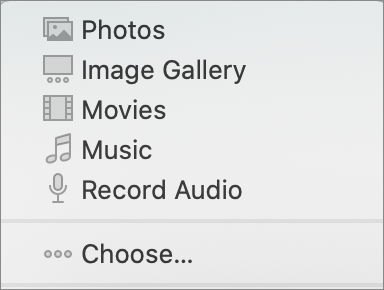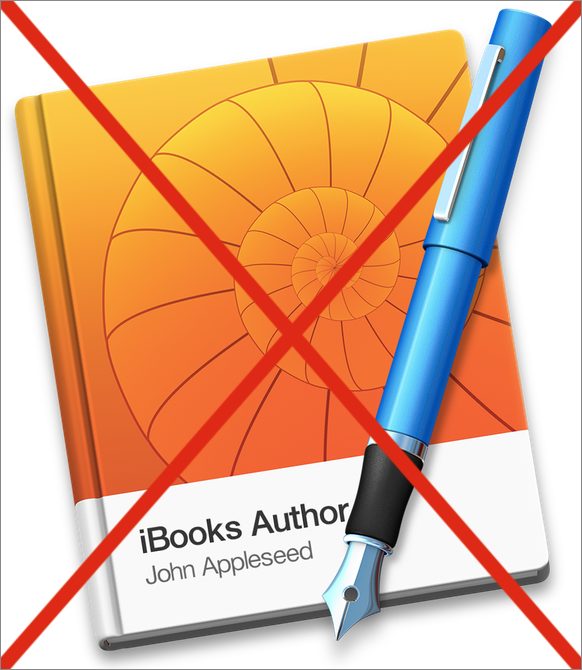Apple to End Support for iBooks Author
Apple has informed participants in its iTunes Connect media publishing service that the iBooks Author app for Mac “will no longer be updated and will soon be removed from the Mac App Store.” This is a moment long feared by fans of iBooks Author (see “iBooks Author Conference Highlights Worries about iBooks Ecosystem,” 24 October 2017).
Introduced at a special education event in early 2012 (see Apple Goes Back to School with iBooks 2, iBooks Author, and iTunes U, 19 January 2012), iBooks Author was Apple’s attempt to provide a tool for “educators and smaller publishers to create their own books.” Apple instead will focus its ebook creation software efforts on Pages and has provided a support document, “Transition from iBooks Author to Pages,” to help iBooks Author users make the switch to Apple’s word-processing and page-layout app.
At its introduction in 2012, iBooks Author seemed to herald a renewed interest in instructional software on Apple’s part. Designed to put the creation of interactive textbooks into the hands of educators, it provided powerful yet (relatively) simple to use word processing and ebook layout features along with a gallery of “widgets,” interactive items that book authors could drop into their manuscripts, such as image galleries, embedded spreadsheets, quizzes, and various kinds of media.

However, ebooks produced with the early versions of iBooks Author were not standard EPUB documents, readable in third-party ebook readers. Instead, they were limited to Apple’s iBooks reading software, which provided support for the non-standard interactive content that iBooks Author books could contain. Nonetheless, many publishers took advantage of the software to produce media-rich books not intended for the educational market, such as travel books and cookbooks.
iBooks Author soon fell on hard times: Apple’s book publishing business became mired in an antitrust case over price-fixing just a few months after iBooks Author was released (see “Explaining the Apple Ebook Price Fixing Suit,” 10 July 2013). While Apple battled the suit, which it eventually lost, the company seemed to lose interest in promoting the app and providing support for educators who wished to use it. Apple continued to update iBooks Author, even adding support for exporting in EPUB format (see “Updates Expand iBooks Author’s Reach,” 10 July 2015), but the company rarely mentioned it in public.
Instead, Apple turned its attention to Pages. Long a part of Apple’s iWork suite, Pages was being completely redesigned by Apple at the same time the company was fighting for its book business in court. When that app, now Pages 5, arrived in late 2013, most observers considered it to be feature-poor compared to the previous versions of Pages (and to iBooks Author), and it offered none of the distinctive capabilities that iBooks Author possessed (see “New Free iLife and iWork Apps Share across Devices and Platforms,” 22 October 2013). Nonetheless, Apple continued to enhance and expand Pages’ capabilities, and recent versions of Pages have included ebook templates, ebook publishing capabilities, and media features similar to some of those in iBooks Author (see “Pages 7.3, Numbers 5.3, and Keynote 8.3,” 12 November 2018).
With the imminent demise of iBooks Author, Pages is the only ebook publishing app from Apple available to publishers and educators. As far as publishers are concerned, the current version of Pages may well fill the void that iBooks Author’s absence will create. Its ebook formatting capabilities have become quite powerful, and, unlike iBooks Author, Pages can produce standard EPUB books that can be read on other devices than Apple’s own.

For educators, Pages is a mixed bag. On the one hand, Pages provides only a few counterparts to iBooks Author’s widgets—specifically, media and image galleries. On the other hand, Pages runs on iPads, iPhones, and Web browsers as well as on Macs and offers collaborative capabilities that iBooks Author never possessed.
This last point is important. Even though educators should have access to powerful ebook publishing tools, few working teachers have the time or expertise to write and publish books on their own while also preparing lesson plans, marking assignments, and, of course, teaching classes. Being able to share the workload, to collaborate with other teachers and with content experts on a book project, is a capability that iBooks Author never offered.
Unlike the proverbial doghouse in which iBooks Author has languished over the last half-decade, Apple has updated Pages regularly and with at least a modicum of fanfare so that people know it exists. In many ways, Pages has become the rich media authoring app that iBooks Author aspired to be. We can hope that Apple brings more of the iBooks Author widgets to future versions of Pages.
Fortunately, veteran iBooks Author users need not discard their hard work when the app they have been using finally disappears into the great bit-bucket in the sky. In its letter to iTunes Connect members, Apple said, “If you have iBooks Author books you’d like to import into Pages for further editing, we have a book import feature coming to Pages soon.”
If that import feature works well, the demise of iBooks Author, while sad, may not be as heartbreaking to aspiring educational authors as it might have been.

The general failure of authoring systems to have extended lives is one of the ongoing disappointments of personal computing in general.
What got me into computing back in the late Eighties was the excitement of HyperCard on the Mac and other systems on the Amiga. Creating beyond productivity or the mimicry of existing media, things that were new, arising from the platform itself. The Web became the vehicle for this but i do wish other options had flourished too.
Alternative Headline: “Apple officially puts iBooks Author out of its misery after a promising launch followed by almost no attention or improvement, leading to its stagnation and ultimate failure to the point where most people had probably forgotten about it by 2017”
Might be a bit long.
Yep, too long.
I understand your disappointment. After all, I wrote a book about iBooks Author, and was ecstatic when iBooks Author came out to see Apple provide an app that educators could use to build rich interactive textbooks. That said, the Pages reboot that gave us Pages 5 has evolved into a very powerful book creation tool by now (Pages 10), with an editing interface much better than that offered by iBooks Author, which feels clunky by comparison.
Apple had a choice of revamping iBooks Author’s increasingly archaic interface to match Pages and to offer the collaborative capabilities and change tracking that Pages now provides—an expensive allocation of resources—or to abandon iBooks Author and provide a migration capability for iBooks Author-created content. Apple has chosen the latter path. It remains to be seen whether Apple will continue to develop capabilities in Pages to replace the iBooks Author features it currently lacks or whether it will drop the ball again.
The article is not correct about iBA and epub. The ability to publish epub 3 format (in addition to .ibooks) was added to the app in 2015.
Apple’s unwillingness to create an iBooks reader app which would run on Windows and Android has always severely limited the potential market for the .ibooks format in any case. Kindle apps are available for all platforms.
True but those EPUBs have to be created using one of the iBooks Author EPUB templates, which only support a limited subset of the iBooks Author widgets: popover, gallery, media, and HTML widgets.
Apple shows little interest in content creators. Their business model relies more and more upon content consumption. The promise sounds hollow based on past experience with low or no feature support for previously high functioning graphics, design, web, photo and video software plus several programming languages. Apple’s graveyard contains giants like MacPaint, MacDraw, HyperCard, Aperture and more.
I’m not sure I agree with that. Macs and iOS devices come with Pages, Numbers, Keynote, iMovie, Photos, and GarageBand for free. These are all very powerful and full-fledged creation apps, far beyond anything that comes with other platforms, but importantly far beyond what we used to get with the Mac. That’s not to mention the completely free developer tools. I would have loved this back when I was a student and had to buy CodeWarrior.
No one is more disappointed by the demise of Aperture than I am (I’m still using it ), but it was a business decision by Apple. There are loads of photo managers and editors available for the Mac (and iOS).
), but it was a business decision by Apple. There are loads of photo managers and editors available for the Mac (and iOS).
If this were even remotely true Apple would not have developed the brand new, super powered Mac Pro + monitor + stand that they clearly articulated as a system for content creators. What I think the strategy here is to make ebook creation even more accessible and easier for entry level content creators, and eventually make things easier for those that use iBook Author.
I was unable to quickly find either a solid number or revenue comparison for market share for iBook vs. Kindle sales, or even how many titles were released exclusively in either digital format. I think it’s safe to assume that Kindle has been relentlessly clobbering iBooks since iBooks was introduced. But ebook sales, whatever the format, never took off to be remotely as big as they were initially expected to be. Social media, digital games and streaming services are the problem. This is especially true among younger audiences.
But the ebook industry is at a major turning point when many publishers are planning to add more interactivity and audio/video content into ebooks. This could be a great opportunity for anyone to create a traditional or multimedia publication right in Pages, and even right on an iPad. And it will be a great opportunity for Michael to write a new book.
Yes I agree the Mac and arguably now the iPad is a marvellous creative tool with all the software and integration Apple offer. You can create content for sure and generally for free.
There’s something underdeveloped however about the overall nature of multimedia, interactive content, rather unbelievably to my mind. It is the state of authoring systems which I was lamenting.
Interactive multimedia was, back in the day (okay, the Eighties), what computing brought to content.
Now we have
The tools to create these have not in my opinion advanced as much as say photo editors, where a wide range of tools from the most simple mobile filter app to the complexity of a Photoshop or Capture One.
The most basic of authoring tools perhaps is keynote/PowerPoint. The most complex being programming and XCode. So many wide gaps in between bar website creation tools, perhaps Hype being the most interesting recent entry. Hard to identify a home for their outcomes other than the web. It all feels underdone to me, kind of a missed opportunity.
I think you make an important point, @tommy. I’m not wedded to this idea, but I think I’d argue that very little interactive content has been successful because it simply hasn’t been that attractive. We can have ebooks with interactive charts or even little games, but there’s never been one that’s so popular that it has raised the bar for what an ebook is. Even with Take Control, where we used my degree in hypertextual fiction and Tonya’s in communication to develop true ebooks with multiple reading paths, it was never clear to us that those efforts, while appreciated by readers, were necessary. In other words, if we’d distributed a flat PDF, people would still have bought it at roughly the same rate. Content was king, not the ebook trimmings.
I believe Adobe are to implement the PDF 2 standard next year which should allow for a lot of multimedia and interactivity (not animations though).